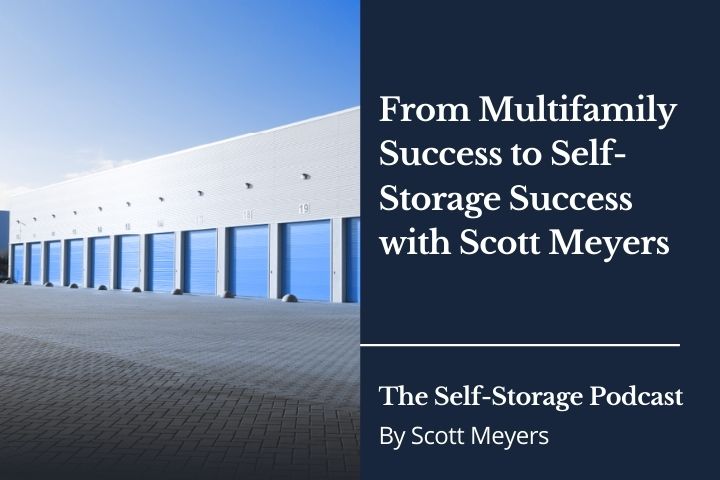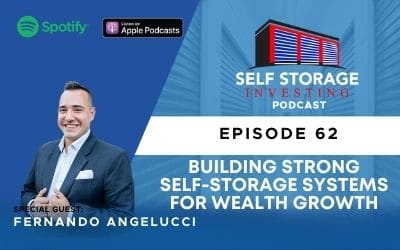Cori Garrod is an expert in contact centers. In this episode she discusses the importance of having a good call center for a self-storage business. She emphasizes the need for compassionate and knowledgeable staff who can provide excellent customer service.
Garrod also highlights the importance of being ready to close a sale at every customer interaction, whether it’s through a website, phone call, or in-person visit. And she shares the pros and cons of having an in-house call center versus outsourcing to a third party.
WHAT TO LISTEN FOR
2:17 Digital transition and online rentals
5:01 The importance of customer service in contact centers
6:38 In-house vs third party contact centers
26:11 Being ready to close sales
Leave a positive rating for this podcast with one click
ABOUT CORI GARROD
Cori has over two decades of expertise in the self-storage industry. With a strong focus on local SEO, digital marketing, customer experience, online reputation management, and contact center operations and technologies.
CONNECT WITH CORI
Website | LinkedIn
CONNECT WITH US
Website | You Tube | Facebook | X | LinkedIn | Instagram
Follow so you never miss a NEW episode! Leave us an honest rating and review on Apple or Spotify.
Register for our January 2024 Academy in Mesa, AZ. Use the code SSAP to save $500.
Episode Transcript
Cori Garrod (00:00):
That can really be a challenge for a lot of people. And if you’ve got those type of managers in your organization trying to build a call center, it makes it a little more difficult.
Announcer (00:16):
This is the Self Storage Podcast where we share the knowledge and skills from the industry’s leading investors, developers, and operators to help you launch and grow your self storage business. Your host, Scott Meyers, over the past 18 years has acquired, developed, converted and syndicated nearly 5 million square feet of self storage nationwide with the help of his incredible team at selfstorageinvesting.com, who has helped thousands of people achieve greatness in Self storage.
Scott Meyers (00:52):
Hello everyone, and welcome back to the Self Storage Podcast. I am your host, Scott Meyers, and on today’s episode we have Cori Garrod with Garrod Self Storage Solutions. Now, Cori is an expert in contact centers, not just call centers, but contact centers. And so well, we’re going to do a little deeper dive into this very important and ever increasingly important aspect of the business, but she’s not just a one trick pony. Cori’s been in the industry for a number of years. I can speak on it many topics. And so with that, Cori, welcome to the show.
Cori Garrod (01:21):
Thank you, Scott. Yes, I’ve been in the industry for 20 years now. Started my career in contact centers 26 years ago, worked for United’s frequent flyer program, got into corporate travel for Deloitte and Touche, and nine 11 happened. I got laid off and got into the self storage industry. I started in 2003 with a local company throughout California. A one self storage is who I worked for 17 years. Started in their contact center back in the days when we have big, giant books of things that were not computerized and we had to flip through different pages to see what we were talking about. When we got a certain store, somebody was calling about pricing and faxing and the whole nine yards. And I said, well, this isn’t going to work. We have to computerize. So wound up actually computerizing all of our information and started having conversations with people on the phone and they kept asking us about pricing on the website.
(02:17):
In 2007, I kept begging our CEO, Hey, let’s do something about the website. Be careful what you wish for because you get put in charge of it. That started my toes in the water for digital marketing. I definitely saw a lot of changes and it was interesting and fun. We wound up doing online rentals in 2014 before most people started doing that. So it’s been kind of an interesting wild ride. Stayed with the company for many, many years, 17 years, and then Covid happened and I said, all right, well maybe time for a change. So I wound up working as the product owner for Hummingbird for the property management software and it’s been interesting and fascinating to work in that space. Really just amazing things. But my true calling and my true passion really is contact centers, which I know not a lot of people will say. It’s kind of an unique and unusual thing, but I decided that’s something that I really wanted to go back to. So just working now with different customers and helping them optimize and streamline their operations or even get set up with a solution has been just an amazing journey and it’s really interesting to see what’s happening in this space now. There’s a lot of challenges, but there’s a lot of opportunity.
Scott Meyers (03:37):
Well, we are excited as well, and as we’ve said, this is the most dynamic and ever changing industry. It is a simple predictable business model that is scalable if you do it right, however, there’s many nuances to it and we have to do ’em all very, very well. And that is like any business traffic and conversion, we have to get the traffic to our website. So it is demand based and so we can’t really generate interest, but we need to be seen and we need to be found when people are looking for self storage. So that’s number one. And then number two is we have to convert and that is the most important piece. We have to answer the phone and we have to be able to gather as much information, help these people as much as possible and secure the next step, whether that’s a rental then and there or a reservation or whatever that looks like because this is, self storage is a commodity.
(04:26):
They’re not shopping for school systems for their stuff to be stored in a particular neighborhood or they’re not looking for a pool like an apartment complex. It needs to be close, clean, secure, and the process needs to be easy so they can check it off their list. So given all of that, let’s talk about the contact center side. When somebody does call, they have a need for storage. What would you say are perhaps the first three, even the top three most important elements that this person within the contact center has to get across or obtain from that potential client?
Cori Garrod (05:01):
Well, first and foremost, you need to make sure you’re answering the phone. I think that’s where a lot of people actually struggle. It’s a challenge and you really have to have somebody who, they may not be the most knowledgeable about the industry, but they have to be very compassionate and just that great personality on the phone. You can train anybody to learn self storage. If I can learn it, anybody can. It’s just the key component is really just having a good compassionate person on the phone who’s willing to just be a very good listener because it is a demand driven business. And we always talk about the four Ds of self storage, and I always, in my training days, I always would remind people it’s like all the four Ds, it doesn’t matter. Everybody’s moving and you remember how stressful moving is. So we all talk about it in that context of moving is a stressful time and you need to be able to help them guide them through that journey and answer those questions in a way that just makes them feel very positive, the experience. And that’s the big piece of making sure that you’ve got a good call center person.
Scott Meyers (06:05):
So Cori, you’re working with folks to either set up or guide them as to whether they should go third party or whether to bring it in-house. Talk about what is that point? Where do you guide someone in terms of bringing it in and training their own folks? Is it just the size or the level or is it time or is it the expense that people really shouldn’t or can’t really do it on their own until they get to a certain size of facilities? Walk through that process that you walk through with clients as they’re exploring the ideas of if I’m running a contact or a call center?
Cori Garrod (06:38):
Exactly. A lot of it’s really size, but a lot of it is also talent. I think that’s one of the things when you’re talking about older properties where you’ve got the live-in managers who maybe not have the best test customer service skills, that can really be a challenge for a lot of people. And if you’ve got those type of managers in your organization trying to build a call center, it makes it a little more difficult. So if you don’t have a high budget and you’ve got on live-in managers, that could be a challenge where you can actually leverage somebody else’s expertise and their technology at a pretty low cost to be able to make sure that your phones get answered. So there are so many different options out there. You could do 30 party property management if you wanted to do that, but XPS solutions or open tech alliance, they offer great call center solutions that you can actually customize.
(07:33):
So you can have your phones roll over if you don’t want them taking all of your phone calls or you can divvy things up so that only your sales calls go somewhere. There’s so many options. You only have to think about what’s best for you and best for your business at the time. But as you start to grow and you start to have 3, 5, 10 locations, maybe that doesn’t always work out. And that’s where I think we see the pushing the tipping point there where it’s like, okay, I think I can probably have somebody in-house answer those phone calls. And you can leverage that a little bit. You can, again, there’s so many options there, just kind of think about how it’s going to customize your operation, give you the extended hours that you’re looking for, and you may leverage both. Even it may be, Hey, I have a call center operation that goes from normal hours nine to five and I want somebody to answer my phones in the evening still. So it really depends on what’s best for you in your business, but there is a solution out there.
Scott Meyers (08:28):
So Cori, when we’re looking at the different aspects of our business and at a facility, the different functions too, marketing, we go back and forth between do we do this all on our own or do we hire an agency who’s an expert? Is that agency going to get our voice? No. So let’s do it in-house property management, similar decision-making process. We’d love to have the third party do it because we don’t want to keep up with everything. They understand that the marketing, they’re in it every day, they’re understanding revenue management and we just don’t want to have the time to train somebody. However, third party management companies, their goal is to get fees for their company. And our goal is just the opposite of that. We want to reduce all of our expenses. So there’s this tug of war, and same with the call center.
(09:15):
I don’t want to train, I don’t want to staff if somebody goes by the wayside or we start out small for the owner operator that starts with one or two. And if somebody goes self or even is sick, they can’t pluck somebody else and put ’em in like you could do if you had a third party company. And to a degree, the same with the marketing or management. Nobody caress 1% as much about your business as you do. And if you have a third party call center, they may get incentivized to increase rentals, but it’s not the same as if they’re on board on the same team and they’re part of this group and they’re in the office just next door or with the rest of the group. So what are some of those other areas in which I guess let’s just speak to Cori, the pros and cons of in-house versus third party?
Cori Garrod (09:57):
Well, you definitely have the ability to customize your messaging. That’s one of the things you can indoctrinate someone. Basically you get somebody who really understands your business, they understand your operations exceedingly well, and they can be a bright star and a star and an excellent advocate for your business. If you’ve got somebody who’s extremely passionate and they’re representing you on the phone, that’s huge. It can actually help you convert better just because they are really super familiar with your properties, they can actually sell exactly what you’ve got, your features and amenities they’re going to know inside out. It’s not going to be something that’s rote. So I think that’s one of the big pros about having somebody in-house. Now, the cons to having somebody in-house of course, is that again, you’ve got people who are sick, you’ve got attrition rates set in turnover and all of those things and it makes it exceedingly difficult.
(10:51):
You’re going to have shorter hours to service. So that can definitely be a con there. And then when we start talking about your third party options, the pro is that they’re extended hours, drop in, drop out, they’re dealing with all the training, they’re making it a lot easier for you, and you don’t have to figure out how that sales call needs to go because they already have a formula. Makes it a lot easier. You don’t have to try and figure out, Hey, how am I really going to sell this? I think third party can actually offer a lot of opportunity, but then again, they don’t know your property inside and out. They don’t know your features and benefits. They’re not able to speak to the customer at that same level as you do somebody in-house. So pros and cons on both sides.
Scott Meyers (11:38):
Could you maybe speak to some specific examples that you’ve seen where you’ve guided a client in one way or another and it created a dramatic impact in a positive way, whether they brought it back in house or they went to third party, either or you choose.
Cori Garrod (11:54):
I think I’ve got a couple of good examples. I think I’ve got a client of mine who was really looking at going with another option, but they’re remotely managed and they need somebody who knows that inside and out and we felt that they could actually handle that well on their own and they’ve got their operations set up and they were pretty solid. So we were able to make some really big changes so that they were actually able to push more toward that, remotely managed that whole model and really change their operations. It’s a very different and unique perspective. When you start talking about remotely managed, that gets into a whole nother level of contact center experience, right? You’ve got some challenges there,
(12:41):
But at the same time, they’re improving their operations and they’ve actually been able to see better answer rates and actually helped reduce the number of staff that they needed for their entire operation just by going. So there’s definitely some pros to that. I was going to say the flip side of that is I’ve got another client where they’ve been struggling with their call center operations. Finding the right person is exceedingly difficult. You can’t always find that it’s a needle in a haystack situation. You need a really good manager who can actually run that operation. And if you don’t have that falling back to the experts who can still answer your phone, having that other third party solution so that they’re not scrambling to make sure something happens, it’s two sides of the same coin. You just really need to make sure that at the end of the day the calls are being answered.
Scott Meyers (13:44):
Well, that is the challenge that many people are facing in our industry and others is it is a very difficult to find good people, and I want to paint a broad brush stroke, but it is, it’s just a challenge right now to be able to find folks in all areas, in all facets of our business. And I would say that that one is a little more unique in terms of a call center and somebody who needs to be upbeat and positive and help and assist and support all day long when everybody comes in. And let’s face it, in our industry, as you just mentioned, the four Ds people, many times their hair’s on fire because they got something going on in their life and they don’t really want to be storing stuff. This is another thing they have to do because of an event that wasn’t very fun, is occurring in their life right now.
(14:25):
And so it is difficult to find those folks, and it’s not a high paying profession in terms of the salaries of call centers, contact centers in the workforce. And so that is always a challenge on that piece. And it’s not like sales where you can pay for performance necessarily. I mean, you can to a degree to our folks, they do act as the sales center as well, but it’s a little more difficult on that end versus some of the others. So that begs the question, and as we are looking and seeing many industries and many positions within multiple industries are now utilizing AI to perform some functions or some facets, some roles and some responsibilities and reducing even staffing, let alone hours that people spend. We’ve seen chatbots that are assisting people on websites and call centers, and the self-storage industry is not new to that. But what does that look like? What does the next step look like? Call it phase two as you get out your crystal ball and see how AI is going to impact our industry.
Cori Garrod (15:28):
The chatbots have been an amazing thing to see. I’ve actually talked to several operators who’ve actually seen a reduction in call volumes because the chatbots can actually answer a lot of those. Hey, what time are you open? Those little minor questions that can be self-service is huge for me. I really hope to see in our industry that we start using that AI actually when people start calling in. So instead of the press option one, two or three, tell me what your problem is and see if I can help you with that. And as that technology improves, it can help improve. It can definitely help reduce call volumes, but actually then really improve the level of service that you’re able to provide to the customers that do reach somebody live on the phone. And the other thing that I would really love to see, and I know it’s happening because I’m starting to see it happen, is using AI to actually go through and do all the transcription for the phone calls.
(16:24):
One of the big challenges as a call center manager is trying to listen to the phone calls. I think everybody, that’s where your energy should be focused, and nobody has the time to actually focus their energy on that. And so having AI come in, do the transcription, rate the call, give you a synopsis of what happened so that you can sort through and figure out what I really need to focus my energy on and what I don’t, it’s going to, I think, make that operation so much better. It’s going to be so much easier for the call center manager just from their perspective because then they can really coach and train and figure out those trouble issues, those sore spots, anything that we really need to coach on. And then you talk about bigger level, then you can just blow that up to a portfolio view and see what customers are really calling about. Hone in on a property, Hey, I know I have a problem with the gates aren’t working here. It’s going to be something that I think’s going to be really game changing, and I hope that we get implemented sooner rather than later. It’ll make everybody’s shop so much easier.
Scott Meyers (17:25):
Well, and it’s interesting, Cori, as we have these many discussions about ai, people are already looking a little further down the road and saying that we’re going to see AI in many, many areas. Most areas of doing business, especially for call it the low hanging fruit or the repetitive q and a FAQs that any business can answer those top 10 to 15 in any industry that can be answered over and over and over again just by using AI and or a chatbot. So as it begins however, to get into the sales side and we begin to see AI in other places, people already feel like we’re going to go full cycle pretty quickly. And then the competitive advantage that people will have is that, Hey, with our company, you actually get to talk to a live person. And so there’s, I think people are trying to get ahead and guess exactly what this is going to look like.
(18:11):
And so I think in between there, the interesting piece is with our unmanned facilities, we were early adopters of utilizing the full blown large kiosks that we used to purchase from the insomniac from OpenTech back in 2005 in our very first facility, we put one in, and then we saw how that has evolved. There was the animated person on there guiding you through the process. And then we went to smaller versions of that and now everything’s done on the phone. And we kind of got away from the little animated person and even in the chat bots. But then we implemented, we went back to larger screen style kiosks and a camera going into a call center, a contact center, and that person comes on the screen and says, Hey, I’m here if you need me, but everything’s right here. And you can look at the units they were over here.
(18:57):
We had ’em set up in the office there for people to view and understand what the size is so that there wasn’t a manager that’d have to take ’em out on a golf cart and show ’em the sizes. But now we’ve kind of even gotten, I think away from that, and I think AI is going to replace that to a degree, but where does that fit in? Is there a place still for a human interaction without having a lot of payroll by having that face pop up and a better utilization of a call center and a live person in addition to ai?
Cori Garrod (19:26):
I really think people expect to transact all their business on their phone now. But it’s one of those challenges, and I’ve been having a lot of conversations around this, is technology is great when it works, when it doesn’t, they expect the response to be immediate and personal. And I think that’s the big challenge, just making sure that there’s that certain level where you can get through and it can be self-service, but when somebody runs up against a problem and they want to talk to a person, please make it so that it’s accessible and that they can actually talk to somebody when they want to. It really has to be on their terms because you’ll know as soon as someone isn’t able to get self-service and they’re not able to get a person on the phone, they will bless you on social media like none other. So they’re used to those tools, but they have this expectation, and as long as you can walk that line, and it’s not an easy one just to make sure that there’s a person available when they need it, however that may be, but if they’re available when they’re having trouble, that I think is the real key to success.
Scott Meyers (20:35):
Yeah, a hundred percent agree. I was just listening to a podcast this morning and the discussion was about Google reviews or reviews online in general and all the tools around it, but then the topic in general, whereas we’ve come accustomed to by way of Amazon and others to see, and social media, how many other people liked or bought this item and was it a four or a five star rating? And we rate our experiences, our purchases, the things that we buy based upon that. And so businesses have known this for a number of years now. And so they’ve gone out and they’ve utilized either hired VAs and other places to pump their numbers up. People have found that as well. And now coming back again to AI where there are folks that are using AI to also improve their Google reviews or their online reviews, I shouldn’t say Google or Amazon in general, but their online reviews.
(21:33):
And at the same time now, there’s also companies that are coming out, developers that are creating the Antifa reviews that are going through and scouring and getting to the bottom of it. So whether it’s a self-audit on your own company or on others as well. And so it seems like a big war game that we’re playing here, a big chess match with regards to ai. But how does a customer sift through that? And I know it’s not as important for self-storage, but how do we ensure that that doesn’t happen, and how do we put ourselves ahead of the pack, if you will?
Cori Garrod (22:05):
I’m one of those people, I’ve been doing this for a long time, marketing and Google reviews and all of those things. That’s something that’s very near and dear to my heart as something that I’ve actually watched us grow in this industry. I’m very white hat, I would say in my methods and one of the keys that I always try to get through to anybody who’s really stressed out about negative reviews and all of those things. And I think for us, if you just take it a step back and evaluate those reviews and see how somebody actually responds to something negative and tries to turn that into a positive experience, that’s really where an operator can win just on that level. I think that a lot of customers can actually understand fake, I mean, it’s in the news. Everybody knows they’re fake reviews, but a lot of the experiences and a lot of the customers that I talked to, it’s like, okay, how did you really find us? And it’s like, oh, this negative review where you actually help this person and resolve their issue, that’s a big win. And I think people always, everybody games the system and they want to make look awesome, but let’s be a real human behind it, be the best that we can be, offer that experience and customers can actually see through it.
Scott Meyers (23:23):
I’ve got a friend of mine and he was in charge of running a customer service center for a company, and he was very quickly promoted within a year to a very high level position. He said, well, because I looked at customer service, our role, our department a little bit differently, and we generated after a year, we were generating more sales out of the customer service department, then the sales department was generating. And so we all know, or at least we’ve heard every challenge, every negative review, every customer complaint is an opportunity. So it’s an opportunity for a sale, it’s an opportunity for a win, it’s an opportunity for a testimonial as you just mentioned. It’s an opportunity for a good review, and people will recognize that and reward your business for it. Ours was just recently where there was a post in one of the forums, one of the real estate forums on self storage that was negatively impacting us.
(24:15):
And we had posted a response to that. And after a handful of folks had kind of weighed in on this and talked about the industry in general, and I posted a comment and said, well, it’s really not like that. And here’s how industry works and here’s how our business is different and how we separate ourselves. And a year later, we had somebody who bought a ticket and showed up at our event, and we always ask, how did you find us? And I said, well, it was on this forum and I saw that you answered a post after all these others, and you were the only one who did. And I never see that where the actual owner of the company post something in a very well thought out response that you had given to that. And very honest and candid. I said, well, I said, well, thank you for being here. I said, we don’t know how to operate any other way other than to be transparent and candid, but people are looking and watching, and you can tell an AI post and you can tell an AI response to a poster as well. And so I think the folks that are continuing to be honest and sincere and genuine, and don’t take the human factor out of everywhere will be rewarded.
Cori Garrod (25:18):
I believe that’s the truth. It’s something that I just hope everybody embraces. It’s been great to see the operators who have, there are people who operate on that same level, and as long as you’re there with transparency and honesty, you can’t help them all the time. Sometimes there are just issues that are too complicated and as well lie to you that that can happen. But just making sure that you’re as empathetic as you can be to the situation regardless of how it plays out. Customers can see that.
Scott Meyers (25:48):
Cori, you could give a masterclass on how to give the best customer experience, but looking at not just for the call center, but just from the time they walk through the door from the time they call, maybe what are some of the top three things that an operator, an owner operator, or a manager should be aware of and mindful of at all times as somebody gets their first experience with their company?
Cori Garrod (26:11):
Well, I think the big thing is it’s been hugely impactful when I quote this statistic to most operators, so I’ll give it to everybody else. The SSA demand study this year said that 70% of customers rent from the very first company that they contact. That’s huge. You have to be there when that customer is ready because if you offer them the best experience online, if they can run online and that’s what they want to do. If they have a question and they chat with you, you need to be able to have that. If they want to be able to call you, you need to be ready and you need to be ready to sell. So your website isn’t good enough to not do online rentals. Everybody needs to be able to do online rentals. You need to be there when the customer is ready. The same thing with the call center.
(26:54):
You need to be able to rent that unit over the phone. You need to make sure your operations are in place so that when somebody comes in, you’re ready to rent. And even if they walk in the door, you need to know that they’re ready to rent. Don’t assume that they’re not ready. And I think that’s a big shift in perspective is just making sure that you’re ready to close that sale each and every time you contact a person, no matter where it is, email, chat, website, phone, it’s all you need to be ready to close the out.
Scott Meyers (27:20):
Yeah, I think by the time somebody comes into your facility, they’re needing storage, they’re ready to rent. They’re not shopping around and looking for, again, school systems and anything else. It’s one more thing that they need to and get off their list of things to do that day. Well, Cori, I appreciate so much your timing and be able to talk about what it is that you do and the importance of it, because this is the most important piece. This is where the conversions occur, is through the contact centers, through our call centers, and when people answer and all those things are important. So what have we left out? What are some of the things that Storage Nation should be asking when they are either making the decision to start or in shopping for a third party contact center to utilize?
Cori Garrod (28:02):
First and foremost, make sure that they’re giving you a tool to be able to close that deal. You need to be able to do the rental. If you’re doing your own call center, make sure that you’ve got the tools available to make sure that you close the deal If you’re working with a third party to be able to run your call center, make sure that they can rent a unit. Reservations just aren’t good enough anymore. And so that’s one of those things that’s like, just really make sure that the tools that you’re using, whichever it’s going to be, that you can close that sale and find the option that works best for you. It doesn’t necessarily have to be in-house. Really consider looking at somebody’s third party with an open mind and really ask a lot of questions and just do your homework. You can talk to, there’s so many people in this industry, this is what I love about our industry. They can tell you the good, bad, and the ugly of everything. So really talk to operators who you think are doing something really efficient. If you call around who your competitors are, who does something really well on the call and who doesn’t ask them who they’re using, it is amazing the amount of information that you can get just talking to others.
Scott Meyers (29:07):
Absolutely. Well said, well said. Well, Cori, once again, thank you so much for your time today. I appreciate you taking time out of your busy schedule. I know that this is a very important piece and you were in high demand, so how do people get in contact with you?
Cori Garrod (29:21):
Well, you can always reach me at garrett self storage solutions.com. That’s my website. Find me on LinkedIn. I’m really easy to find, Cori Garrett, I’m there. Super easy to get ahold of me. Ask me any questions that you might have. I’ll be responsive. I’m sure you can find my cell phone number on my LinkedIn profile, but definitely reach out. Let me know if you have any questions. Even if we’re not going to work together and you just need somebody to bounce an idea off or get pointed in the right direction, is something that I’m definitely willing to do.
Scott Meyers (29:51):
So Cori, as we end, Is there Maybe a book that you’ve read that’s had a big impact on you or something that you’re reading right now that you’d like to share with Storage Nation?
Cori Garrod (30:01):
Yeah, I’ve got a great book is Who Would Do What by when. And I love this book. It’s a quick read. It’s written, it’s an entertaining book, but the message in this book is about accountability, who will do what and by when, and I’ve worked with several organizations who are embracing this concept and seen their operations just improve. And once everybody reads it and understands the level of accountability, it just improves the operations so much better. It’s an easy read, it’s really entertaining, but I think it’s very impactful for an operation.
Scott Meyers (30:37):
Fantastic. We spend time on this from time to time after reading Jim Collins. Good to great talking about Right People, right Seat on the bus, and I don’t think you could revisit that theory, that concept enough. And so this sounds like just another good tool and resource for folks out there to be able to hone in on that. Well, storage Nation, you have been listening to Cori Gard with Garrett’s Self Storage Solutions. So Cori, once again, thanks so much for your time. Look forward to catching up with you again soon.
Cori Garrod (31:04):
Alright, thanks Scott.
Scott Meyers (31:05):
All right, take care.
Announcer (31:10):
Hey gang, wait three things before you leave. First, don’t forget to follow the Self Storage Podcast and turn on your notification so you never miss another episode. And while you’re there, please leave us a five star review if you like the show. Second, be sure to share your favorite episodes and more via Instagram, and don’t forget to tag us. And lastly, head to the links in the show description and hit follow on Twitter and Facebook to get a front row seat as we grow and scale our business and bring you along with us.















